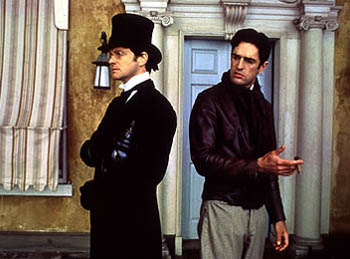![[Metroactive Movies]](/movies/gifs/movies468.gif)
[ Movies Index | Show Times | Santa Cruz Week | SantaCruz Home | Archives ]
 Back to Back: Firth and Everett in 'The Importance of Being Earnest.' Wilde in the Streets Useless attempt at an update drags 'Earnest' through the mud IN THE PRESS NOTES for the new film of The Importance of Being Earnest, director Oliver Parker notes, "I was intrigued by [the play's] specific relationship to A Midsummer Night's Dream." Though that sentence may not seem revealing, it gives the wary viewer an idea of how ruthlessly Parker has lowered the boom on Oscar Wilde. Parker's method is the same one film directors have used lately to renovate Shakespeare. It's like a waiter sousing a platter of duck al'orange with ketchup in the hope a kid will eat it. Wilde, however, isn't as universal or as resilient as Shakespeare. He's rooted to a time and place: the 1890s and Victorian London. The 1956 film version has remained definitive because of its refusal to be updated or opened up for the screen; the proscenium arch is practically visible above its peerless cast. For a play in which social artifice is the theme and text, it's no disgrace to heighten the artificiality of a film of the play. Making this play "relevant" is an inane plan. The Importance of Being Earnest is a trifle among trifles: a story of two dear chums, Algernon (Rupert Everett) and Jack (Colin Firth), who engage in harmless deceptions to free themselves from such duty as might afflict a pair of lounging gentlemen. To get out of disagreeable societal duty, Algernon tells a lie about a dying friend named Bunbury who lives in the country. Jack uses the pseudonym Ernest to give himself a different identity in town than he has in the country. However, both deceptions prove dicey when the men fall in love: Jack loves Gwendolen (Frances O'Connor), a girl enamored with the name Ernest; Algernon is captivated by Jack's ward, Cecily (Reese Witherspoon), a girl with romantic illusions of her own. Though Witherspoon looks very pretty with bangs, she seems self-conscious with her accent. By contrast, O'Connor, who was born with her accent, plays Gwendolen as an ardent, heavy-breathing girl--she seems to be fighting her corset. Jack's country manor is West Wycombe, the estate owned by Sir Frances Dashwood, proprietor of the Hellfire Club. It's a lovely background, rich with blasphemous history, but you rarely get a chance to enjoy it. The early scenes of London bordellos, gambling halls and the 1890s version of Cabaret's Kit Kat Club are all meant to remind us that Jack and Algernon's seemingly harmless monkeyshines conceal a world of hypocrisy and male privilege--and really, how pedantic. Worse is Parker's attempt liven up the play with spit takes, jazz bands and a butt shot (Cecily getting the name Ernest tattooed on her ass). Amid these indescribably forced shenanigans, Judi Dench offers a reprieve. Although Parker's tasteless editing destroys the momentum of her performance, Dench rejoices in the seriocomic authority of Lady Bracknell. Dench stands out in this pandering film like a diamond in a hooker's earlobe.
The Importance of Being Earnest (PG; 95 min.), directed by Oliver Parker, based on the play by Oscar Wilde, photographed by Tony Pierce-Roberts and starring Rupert Everett, Colin Firth, Reese Witherspoon and Judi Dench, opens Friday at the Nickelodeon in Santa Cruz. [ Santa Cruz Week | Metroactive Central | Archives ]
|
From the May 29-June 5, 2002 issue of Metro Santa Cruz.
Copyright © Metro Publishing Inc. Maintained by Boulevards New Media.